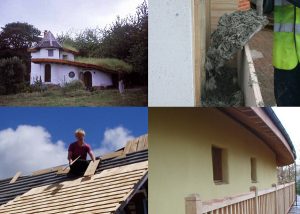First some background, then below is Zoe’s appeal for letters of support. Wouldn’t it be good if people were allowed to put up their own natural home on their own land, to produce food for themselves and for the rest of us. You may not want to do it, but wouldn’t it be good if it were an option for those who do? I would have thought that this would be seen as a fine aim, by people from both sides of the political spectrum.
The planning system doesn’t allow it, however. Now planners have the very important job of stopping urban sprawl and the despoilation of the countryside, but we’re not talking urban sprawl, or commuter villages or second homes. We’re talking about organic smallholders, who improve the environment by not using agrochemicals, by sequestering soil carbon, and by increasing both crop diversity and biodiversity, and who revive traditional skills and strenghten local economies via the production of food, timber, raw materials and crafts. Huge monoculture farmers are not guardians of the countryside, but organic smallholders are, and always have been.
The planning system doesn’t allow people to live in the open countryside, but we’re suggesting that it should, as long as they abide by very strict ecological criteria – small homes built from natural, local materials, off-grid, using the land to produce food efficiently, etc. Smallholdings produce more food per acre than large monoculture farms, and the Ecological Land Co-op are serious about food production. They have plans for three low-impact smallholdings in Devon. Their application was rejected by mid-Devon councillors, despite recommendations for approval from the parish council and the planning department. They are appealing the decision, and seeking a full public enquiry with a planning inspector to debate the merits of the scheme.
We would be extremely grateful if you could find the time to write a letter of support for our proposed smallholdings at Greenham Reach by November 15. If you have time to write, some points you may wish to make (as appropriate):
- Making reference to your own experience, what you conclude to be the likely public benefits. This could cover, for example, affordable housing/holdings, climate change mitigation and adaptation, providing sustainable rural employment, biodiversity benefits, research into low-input agriculture, and so forth. It is stronger if you are able to refer to government policies that support the benefits your cite. If you want to read a summary of our proposals see Greenham Reach.
- If you have witnessed a need for affordable holdings of the type we are hoping to provide, and the extent of that need.
- If you are a small-scale ecological producer, the impact living away from your holding would have on you and your business. For example, Charles Dowding, salad grower wrote “Making a living off small areas of land demands a lot of time and at many different times, for which living off site is impractical. Living on the land saves both time and money, the land workers’ most precious assets, enough to make all the difference in demanding work”. Others who have written have gone into more detail, for example, talking about the losses they’ve incurred from not attending to a polytunnel in unexpected high winds.
How to submit a letter of support:
Please refer to our appeals APP/Y1138/A/12/2181807, APP/Y1138/A/12/2181808 and APP/Y1138/A/12/2181821 (Greenham Reach) in any correspondence.
Email: Rachel Owen [email protected]
In writing to: the Planning Inspectorate at 3/20 Wing, Temple Quay House, 2 The Square, Temple Quay, Bristol BS1 6PN
If you want to contact us to discuss a letter of support further, please contact Zoe on 07963 955338 or [email protected]
It’s very important that your correspondence is polite – any abusive correspondence will harm our case.
By the way, it has been reported in the local press that the Council have already allocated £40,000 to fight our appeal. Yes, that’s £40k of taxpayers’ money to try and stop people building a small, natural home and producing food on their own land – something that ordinary people have been able to do throughout human history, until now.







